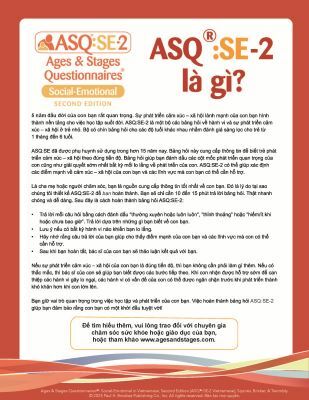What is ASQ:SE-2? in Vietnamese
Provide reassurance and allay fears by communicating thoughtfully about the screening process from the get-go. Share this handout with Vietnamese-speaking parents to explain the basics of ASQ:SE-2. Read More

Provide reassurance and allay fears by communicating thoughtfully about the screening process from the get-go. Share this handout with Vietnamese-speaking parents to explain the basics of ASQ:SE-2. Read More

Holding a parent–teacher conference with Vietnamese-speaking parents to share ASQ:SE-2 results? Use this form to take notes and help guide your conversation. Read More

Looking for an easy way to track a child’s ASQ:SE-2 screening results over time? Programs with Vietnamese-speaking providers can download and complete this form to easily monitor a child’s progress. Read More

Metro United Way’s successful Ages & Stages Developmental Screening Hub provides free, ongoing screening with ASQ®-3 and ASQ®:SE-2 for children from 2 months to 5½ years of age. Join us for an informative ASQ Innovators webinar with Developmental Screening Manager Kimberly Broecker, who will share both successes and lessons learned from this 12-year-old initiative. Read More
In July 2021, Delaware became the first state in the country to require screening in licensed child care. With the groundbreaking Developmental Screening Bill, Delaware required all licensed child care programs to complete developmental screening for children in their care, from ages 0-5. Read More
Early childhood home visiting professionals collaborate with families to create a healthy, nurturing environment where young children can learn and thrive. Because a big part of healthy development is regular screening, home visiting programs should be using a reliable tool like ASQ® with every young child they work with. See… Read More
Running a successful screening program is a balancing act that demands time, resources, and lots of coordination. Plenty of organizations get it right, but it’s not always easy. See how ASQ Online can enhance your screening program with online data management, electronic questionnaire completion, and much more. Read More
Presented by ASQ developers and trainers Jane Squires, Elizabeth Twombly, and Dalia Avello, this information-packed webinar covers important topics for early childhood directors and administrators interested in starting or supporting their screening program. Read More
Joining us for a Q&A is Jane Squires, Ph.D., a professor of special education at the University of Oregon and co-developer of the internationally renowned Ages & Stages Questionnaires® (ASQ®). In this article, Dr. Squires will answer seven commonly asked questions about screening and development Read More
Sometimes professionals have questions when scoring ASQ-3. Use these tips, translated into Spanish, to help you score ASQ-3 questionnaires accurately every time. Read More
